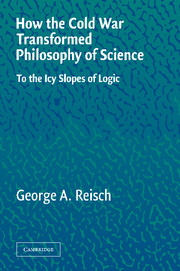Book contents
- Frontmatter
- Contents
- Preface and Acknowledgments
- 1 An Introduction to Logical Empiricism and the Unity of Science Movement in the Cold War
- 2 Otto Neurath, Charles Morris, Rudolf Carnap, and Philipp Frank: Political Philosophers of Science
- 3 Leftist Philosophy of Science in America and the Reception of Logical Empiricism in New York City
- 4 “Doomed in Advance to Defeat”? John Dewey on Reductionism, Values, and the International Encyclopedia of Unified Science
- 5 Red Philosophy of Science: Blumberg, Malisoff, Somerville, and Early Philosophy of Science
- 6 The View from the Left: Logical Empiricism and Radical Philosophers
- 7 The View from the Far Left: Logical Empiricism and Communist Philosophers
- 8 Postwar Disillusionment, Anti-Intellectualism, and the Values Debate
- 9 Horace Kallen's Attack on the Unity of Science
- 10 Creeping Totalitarianism, Creeping Scholasticism: Neurath, Frank, and the Trouble with Semantics
- 11 Frank's Neurathian Crusade: Science, Enlightenment, and Values
- 12 “A Very Fertile Field for Investigation”: Anticollectivism and Anticommunism in Popular and Academic Culture
- 13 Anticommunist Investigations, Loyalty Oaths, and the Wrath of Sidney Hook
- 14 Competing Programs for Postwar Philosophy of Science
- 15 Freedom Celebrated: The Professional Decline of Philipp Frank and the Unity of Science Movement
- 16 The Marginalization of Charles Morris
- 17 Values, Axioms, and the Icy Slopes of Logic
- 18 Professionalism, Power, and What Might Have Been
- References
- Index
18 - Professionalism, Power, and What Might Have Been
Published online by Cambridge University Press: 21 January 2010
- Frontmatter
- Contents
- Preface and Acknowledgments
- 1 An Introduction to Logical Empiricism and the Unity of Science Movement in the Cold War
- 2 Otto Neurath, Charles Morris, Rudolf Carnap, and Philipp Frank: Political Philosophers of Science
- 3 Leftist Philosophy of Science in America and the Reception of Logical Empiricism in New York City
- 4 “Doomed in Advance to Defeat”? John Dewey on Reductionism, Values, and the International Encyclopedia of Unified Science
- 5 Red Philosophy of Science: Blumberg, Malisoff, Somerville, and Early Philosophy of Science
- 6 The View from the Left: Logical Empiricism and Radical Philosophers
- 7 The View from the Far Left: Logical Empiricism and Communist Philosophers
- 8 Postwar Disillusionment, Anti-Intellectualism, and the Values Debate
- 9 Horace Kallen's Attack on the Unity of Science
- 10 Creeping Totalitarianism, Creeping Scholasticism: Neurath, Frank, and the Trouble with Semantics
- 11 Frank's Neurathian Crusade: Science, Enlightenment, and Values
- 12 “A Very Fertile Field for Investigation”: Anticollectivism and Anticommunism in Popular and Academic Culture
- 13 Anticommunist Investigations, Loyalty Oaths, and the Wrath of Sidney Hook
- 14 Competing Programs for Postwar Philosophy of Science
- 15 Freedom Celebrated: The Professional Decline of Philipp Frank and the Unity of Science Movement
- 16 The Marginalization of Charles Morris
- 17 Values, Axioms, and the Icy Slopes of Logic
- 18 Professionalism, Power, and What Might Have Been
- References
- Index
Summary
Like any story, the one told here of the rise and fall of the Unity of Science movement in North America is incomplete. Besides the anticommunist pressures described here, other forces and circumstances surely helped to determine the evolution of philosophy of science through the Cold War. Two explored briefly in this chapter are the decline in North America of so-called public intellectuals and the growth of research universities as the main institutions of intellectual life in North America. Both are connected to Cold War anticommunism, and this chapter introduces them as a frame to examine some commonplaces about logical empiricism and the unity of science as well as contemporary interest in the disunity of science. It also addresses two specific questions raised by this story. One concerns the unique role given to Rudolf Carnap, who is depicted both as a leftist philosopher of science in the 1930s and as a professional, apolitical philosopher during and after the Cold War. The other question is one that will have occurred to many readers long before reaching this final chapter: Can't the depoliticization of philosophy of science in the 1950s, described here as the result of multifaceted forces arising from anticommunist powers, be interpreted better as a development or maturation through which twentieth-century philosophy (finally) acknowledged a fundamental and proper disconnection between philosophical research and political partisanship?
- Type
- Chapter
- Information
- How the Cold War Transformed Philosophy of ScienceTo the Icy Slopes of Logic, pp. 369 - 388Publisher: Cambridge University PressPrint publication year: 2005



